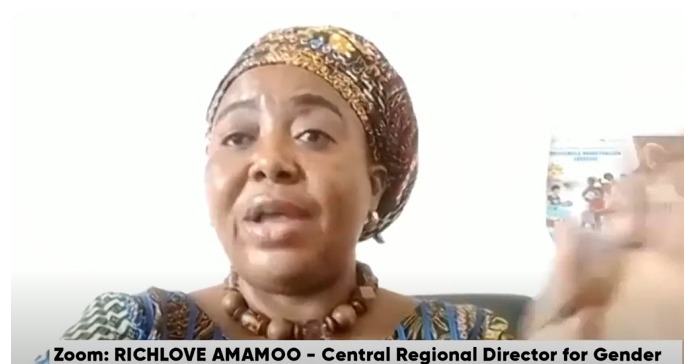
Audio By Carbonatix
The Central Regional Director of Gender under the Ministry of Gender, Children and Social Protection (MoGCSP), Mrs Richlove Amamoo, says some programmes have been implemented aimed at ending the practice of young girls having to trade sex for money to purchase sanitary pads.
According to her, there are various initiatives, including parental education clubs and sensitisation sessions for adolescent girls.
Speaking on JoyNews’ AM Show on May 27, she said, “So sometimes we meet both the parents and the girls. The girls are girls that we have trained, so they speak up and they told us the challenges they are having with their parents, parents not providing them with their needs."
“So we have realised that when it is for their period, it is difficult for them to get sanitary pads to use and that is the problem. Some children came out to say it is because of that, they have to enter into a relationship, so that at least at the end of the month, they can get something to buy sanitary pads.”
According to the director, non-governmental organisations (NGOs) collect data without sharing it with the government machinery operating in the region.
“We don’t even know what they come here to do. So you have this data, you should have worked through the department of gender so that RCC will know what you are doing in the region.”
Mrs Amamoo revealed that a meeting was held on May 15, with all NGOs operating in the region to strengthen collaboration and coordination efforts.
She pointed out the need for parents to understand their legal obligations regarding parental responsibility, highlighting that neglecting children's needs is a criminal offence.
“That is why we said, we can’t do it alone. On the 15th May, we brought all the NGO’s operating in the region together. We met them and we want to strengthen collaboration with them so that we can join hands together and try to control the situation.”
“So when you come to the region to do that, we must be aware of what you are doing so that we can support. The only way this thing can work is to let us parents know the position of the law. When it comes to parental responsibility that is a criminal offence if you don’t take care of your children. And if parents become responsible, we can control the situation.”
Latest Stories
-
‘Adom FM’s Strictly Highlife’ lights up La Palm with a night of rhythm and nostalgia
4 minutes -
Ghana is rising again – Mahama declares
5 hours -
Firefighters subdue blaze at Accra’s Tudu, officials warn of busy fire season ahead
5 hours -
New Year’s Luv FM Family Party in the park ends in grand style at Rattray park
5 hours -
Mahama targets digital schools, universal healthcare, and food self-sufficiency in 2026
6 hours -
Ghana’s global image boosted by our world-acclaimed reset agenda – Mahama
6 hours -
Full text: Mahama’s New Year message to the nation
6 hours -
The foundation is laid; now we accelerate and expand in 2026 – Mahama
6 hours -
There is no NPP, CPP nor NDC Ghana, only one Ghana – Mahama
6 hours -
Eduwatch praises education financing gains but warns delays, teacher gaps could derail reforms
6 hours -
Kusaal Wikimedians take local language online in 14-day digital campaign
7 hours -
Stop interfering in each other’s roles – Bole-Bamboi MP appeals to traditional rulers for peace
8 hours -
Playback: President Mahama addresses the nation in New Year message
8 hours -
Industrial and Commercial Workers’ Union call for strong work ethics, economic participation in 2026 new year message
10 hours -
Crossover Joy: Churches in Ghana welcome 2026 with fire and faith
10 hours

